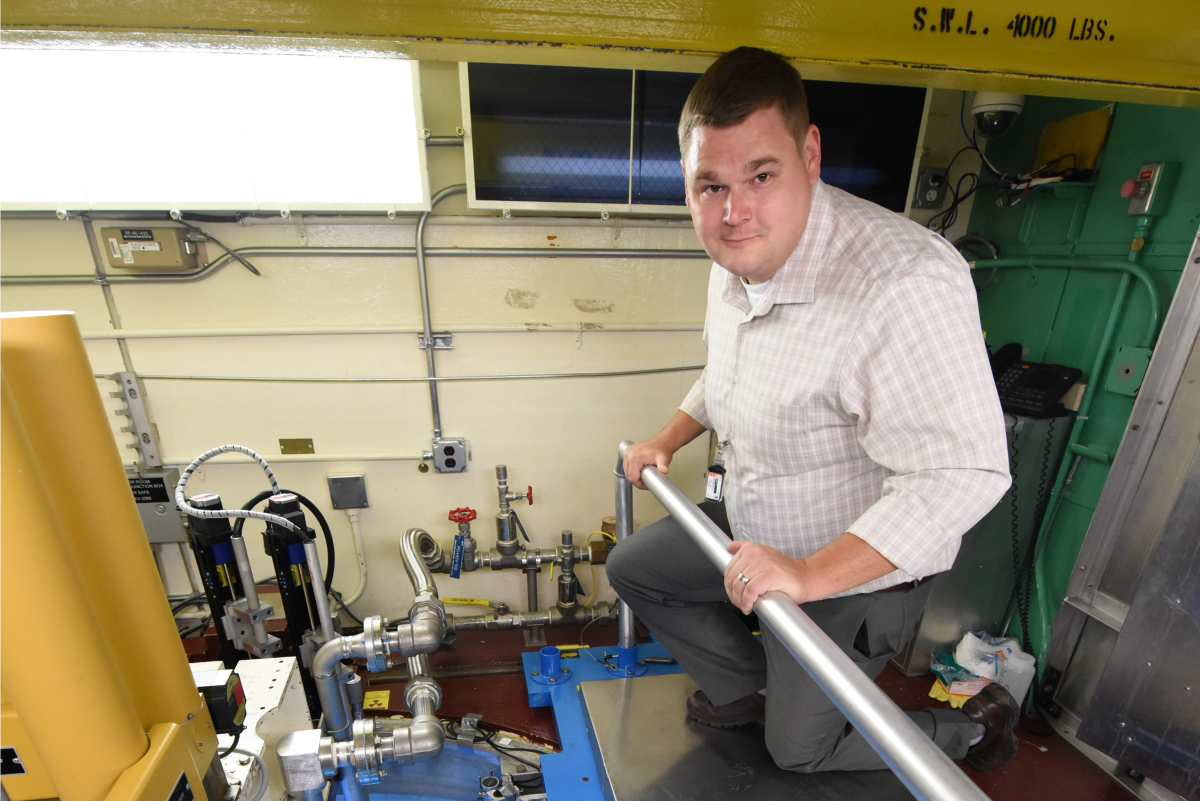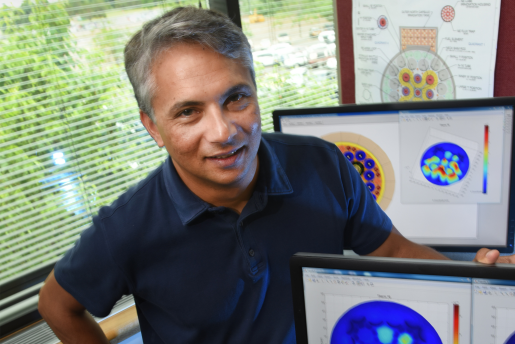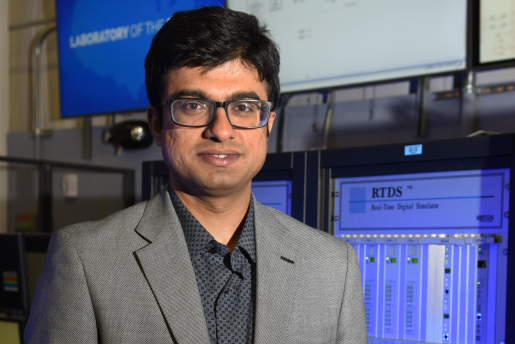Blog
10 Jobs in Nuclear Starting at $60K or Higher
Nuclear energy has a host of careers that utilize many diverse skill sets, and the pay isn't bad either. These 10 jobs start at $60K or higher.
Office of Nuclear Energy
February 22, 2018
 min
minute read time
min
minute read time
Photo Title
Research Scientist - $72,000
Caption
Research scientists contribute to our understanding of nuclear energy through investigation and computer simulation. They work in industry, university research departments, government labs and defense companies. Research scientists perform a wide variety of tasks, including seismic experts that might investigate ways to make structures safer and less expensive.
Credit
Idaho National Laboratory
Photo Title
Nuclear Engineer - $71,000
Caption
Nuclear engineers use knowledge of physics, math and engineering to develop and operate nuclear power plants and fuels. They get a first-hand look at improving and powering our energy future. Nuclear engineers design the next generation of nuclear reactors to be smaller, safer and more efficient.
Credit
Idaho National Laboratory
Photo Title
Electrical Engineer - $71,000
Caption
Electrical engineers use quantitative skills and problem solving to work with all types of electronics and electrical equipment. From designing and developing ideas to producing and crafting those projects into reality, electrical engineers are the people who make the technology all around us work. At a nuclear facility, electrical engineers may be responsible for designing and enhancing backup power systems.
Credit
Idaho National Laboratory
Photo Title
Mechanical Engineer - $71,000
Caption
Mechanical engineers maintain the functionality of almost every industry and system across the country. Designing, testing and producing mechanical systems through the application of math, science and creative thinking are some of the skills needed for success. Although mechanical engineering is one of the broadest fields within engineering, those who have a career within nuclear might get the chance to work with some unique and complex systems that aren’t found elsewhere.
Credit
Idaho National Laboratory
Photo Title
Materials Scientist - $70,000
Caption
These scientists study the properties of different materials. Through experimentation and computer modeling, they discover how to improve these materials or create new ones altogether. Materials scientists are crucial to the success of nuclear. Reactors and their facilities require specialized materials, and these scientists research the behavior of existing materials in extreme environments and help create new solutions as needed.
Credit
Idaho National Laboratory
Photo Title
Physicist - $68,000
Caption
A physicist explores matter and energy, adding to our understanding of the world around us. By employing science and working with data, physicists are good problem solvers. Someone who works as a reactor physicist, for example, may examine how particles like neutrons and gamma rays move inside a reactor and affect overall reactor operation.
Credit
Idaho National Laboratory
Photo Title
Computer Scientist - $67,000
Caption
Computer scientists develop algorithms and techniques to solve complex problems and apply them in a variety of different computational disciplines. From creating computer simulation models to developing social networks, computer scientists are building the future. Someone working within nuclear energy might develop and use modeling software to simulate complex systems and study all sorts of physical phenomena.
Credit
Idaho National Laboratory
Photo Title
Power Engineer - $67,000
Caption
If you are interested in energy, you may want to consider this subset of engineering. Drawing on skillsets from other engineering disciplines, power engineers make sure our grid is up and running to provide the electricity that powers our day to day lives. Power engineers can help make all sorts of electricity greener and more reliable, and are especially important in facilities like a nuclear power plant.
Credit
Idaho National Laboratory
Photo Title
Computer Software Developer - $67,000
Caption
Software developers use their practical knowledge to build software using the evolving best practices in the industry. The software that they produce meets the needs of users all over the world. Modeling and simulation software is especially important within the nuclear field, where scientists and engineers rely on software developers to create robust, maintainable software ready for deployment to industry.
Credit
Idaho National Laboratory
Photo Title
Chemist - $62,000
Caption
Chemists work in a number of areas, ranging from medicine to engineering. As scientists, they study and experiment with matter and compounds to reach a goal, complete a mission, or add to our body of knowledge. Chemists may be involved in nuclear science in a number of ways, such as by extracting targeted metals and other critical elements from used nuclear fuels to minimize waste production.
Credit
Idaho National Laboratory
Photo Title
Research Scientist - $72,000
Caption
Research scientists contribute to our understanding of nuclear energy through investigation and computer simulation. They work in industry, university research departments, government labs and defense companies. Research scientists perform a wide variety of tasks, including seismic experts that might investigate ways to make structures safer and less expensive.
Credit
Idaho National Laboratory
Research Scientist - $72,000
Research scientists contribute to our understanding of nuclear energy through investigation and computer simulation. They work in industry, university research departments, government labs and defense companies. Research scientists perform a wide variety of tasks, including seismic experts that might investigate ways to make structures safer and less expensive.
Idaho National Laboratory
Photo Title
Nuclear Engineer - $71,000
Caption
Nuclear engineers use knowledge of physics, math and engineering to develop and operate nuclear power plants and fuels. They get a first-hand look at improving and powering our energy future. Nuclear engineers design the next generation of nuclear reactors to be smaller, safer and more efficient.
Credit
Idaho National Laboratory
Nuclear Engineer - $71,000
Nuclear engineers use knowledge of physics, math and engineering to develop and operate nuclear power plants and fuels. They get a first-hand look at improving and powering our energy future. Nuclear engineers design the next generation of nuclear reactors to be smaller, safer and more efficient.
Idaho National Laboratory
Photo Title
Electrical Engineer - $71,000
Caption
Electrical engineers use quantitative skills and problem solving to work with all types of electronics and electrical equipment. From designing and developing ideas to producing and crafting those projects into reality, electrical engineers are the people who make the technology all around us work. At a nuclear facility, electrical engineers may be responsible for designing and enhancing backup power systems.
Credit
Idaho National Laboratory
Electrical Engineer - $71,000
Electrical engineers use quantitative skills and problem solving to work with all types of electronics and electrical equipment. From designing and developing ideas to producing and crafting those projects into reality, electrical engineers are the people who make the technology all around us work. At a nuclear facility, electrical engineers may be responsible for designing and enhancing backup power systems.
Idaho National Laboratory
Photo Title
Mechanical Engineer - $71,000
Caption
Mechanical engineers maintain the functionality of almost every industry and system across the country. Designing, testing and producing mechanical systems through the application of math, science and creative thinking are some of the skills needed for success. Although mechanical engineering is one of the broadest fields within engineering, those who have a career within nuclear might get the chance to work with some unique and complex systems that aren’t found elsewhere.
Credit
Idaho National Laboratory
Mechanical Engineer - $71,000
Mechanical engineers maintain the functionality of almost every industry and system across the country. Designing, testing and producing mechanical systems through the application of math, science and creative thinking are some of the skills needed for success. Although mechanical engineering is one of the broadest fields within engineering, those who have a career within nuclear might get the chance to work with some unique and complex systems that aren’t found elsewhere.
Idaho National Laboratory
Photo Title
Materials Scientist - $70,000
Caption
These scientists study the properties of different materials. Through experimentation and computer modeling, they discover how to improve these materials or create new ones altogether. Materials scientists are crucial to the success of nuclear. Reactors and their facilities require specialized materials, and these scientists research the behavior of existing materials in extreme environments and help create new solutions as needed.
Credit
Idaho National Laboratory
Materials Scientist - $70,000
These scientists study the properties of different materials. Through experimentation and computer modeling, they discover how to improve these materials or create new ones altogether. Materials scientists are crucial to the success of nuclear. Reactors and their facilities require specialized materials, and these scientists research the behavior of existing materials in extreme environments and help create new solutions as needed.
Idaho National Laboratory
Photo Title
Physicist - $68,000
Caption
A physicist explores matter and energy, adding to our understanding of the world around us. By employing science and working with data, physicists are good problem solvers. Someone who works as a reactor physicist, for example, may examine how particles like neutrons and gamma rays move inside a reactor and affect overall reactor operation.
Credit
Idaho National Laboratory
Physicist - $68,000
A physicist explores matter and energy, adding to our understanding of the world around us. By employing science and working with data, physicists are good problem solvers. Someone who works as a reactor physicist, for example, may examine how particles like neutrons and gamma rays move inside a reactor and affect overall reactor operation.
Idaho National Laboratory
Photo Title
Computer Scientist - $67,000
Caption
Computer scientists develop algorithms and techniques to solve complex problems and apply them in a variety of different computational disciplines. From creating computer simulation models to developing social networks, computer scientists are building the future. Someone working within nuclear energy might develop and use modeling software to simulate complex systems and study all sorts of physical phenomena.
Credit
Idaho National Laboratory
Computer Scientist - $67,000
Computer scientists develop algorithms and techniques to solve complex problems and apply them in a variety of different computational disciplines. From creating computer simulation models to developing social networks, computer scientists are building the future. Someone working within nuclear energy might develop and use modeling software to simulate complex systems and study all sorts of physical phenomena.
Idaho National Laboratory
Photo Title
Power Engineer - $67,000
Caption
If you are interested in energy, you may want to consider this subset of engineering. Drawing on skillsets from other engineering disciplines, power engineers make sure our grid is up and running to provide the electricity that powers our day to day lives. Power engineers can help make all sorts of electricity greener and more reliable, and are especially important in facilities like a nuclear power plant.
Credit
Idaho National Laboratory
Power Engineer - $67,000
If you are interested in energy, you may want to consider this subset of engineering. Drawing on skillsets from other engineering disciplines, power engineers make sure our grid is up and running to provide the electricity that powers our day to day lives. Power engineers can help make all sorts of electricity greener and more reliable, and are especially important in facilities like a nuclear power plant.
Idaho National Laboratory
Photo Title
Computer Software Developer - $67,000
Caption
Software developers use their practical knowledge to build software using the evolving best practices in the industry. The software that they produce meets the needs of users all over the world. Modeling and simulation software is especially important within the nuclear field, where scientists and engineers rely on software developers to create robust, maintainable software ready for deployment to industry.
Credit
Idaho National Laboratory
Computer Software Developer - $67,000
Software developers use their practical knowledge to build software using the evolving best practices in the industry. The software that they produce meets the needs of users all over the world. Modeling and simulation software is especially important within the nuclear field, where scientists and engineers rely on software developers to create robust, maintainable software ready for deployment to industry.
Idaho National Laboratory
Photo Title
Chemist - $62,000
Caption
Chemists work in a number of areas, ranging from medicine to engineering. As scientists, they study and experiment with matter and compounds to reach a goal, complete a mission, or add to our body of knowledge. Chemists may be involved in nuclear science in a number of ways, such as by extracting targeted metals and other critical elements from used nuclear fuels to minimize waste production.
Credit
Idaho National Laboratory
Chemist - $62,000
Chemists work in a number of areas, ranging from medicine to engineering. As scientists, they study and experiment with matter and compounds to reach a goal, complete a mission, or add to our body of knowledge. Chemists may be involved in nuclear science in a number of ways, such as by extracting targeted metals and other critical elements from used nuclear fuels to minimize waste production.
Idaho National Laboratory
Nuclear energy generates nearly 20% of America’s electricity and is the country’s largest source of carbon-free power. But did you also know it fuels our economy, supporting nearly half a million jobs in the United States?
The nuclear energy industry has a host of careers that utilize many diverse skill sets—and the pay isn’t bad either.
Don’t believe us?
Check out these 10 jobs in nuclear energy that have average starting salaries of $60,000 a year or higher.
Research Scientist - $72,000
Research scientists contribute to our understanding of nuclear energy through investigation and computer simulation. They work in industry, university research departments, government labs and defense companies. Research scientists perform a wide variety of tasks, including seismic experts that might investigate ways to make structures safer and less expensive.
Nuclear Engineer - $71,000
Nuclear engineers use knowledge of physics, math and engineering to develop and operate nuclear power plants and fuels. They get a first-hand look at improving and powering our energy future. Nuclear engineers design the next generation of nuclear reactors to be smaller, safer and more efficient.
Electrical Engineer - $71,000
Electrical engineers use quantitative skills and problem solving to work with all types of electronics and electrical equipment. From designing and developing ideas to producing and crafting those projects into reality, electrical engineers are the people who make the technology all around us work. At a nuclear facility, electrical engineers may be responsible for designing and enhancing backup power systems.
Mechanical Engineer - $71,000
Mechanical engineers maintain the functionality of almost every industry and system across the country. Designing, testing and producing mechanical systems through the application of math, science and creative thinking are some of the skills needed for success. Although mechanical engineering is one of the broadest fields within engineering, those who have a career within nuclear might get the chance to work with some unique and complex systems that aren’t found elsewhere.
Materials Scientist - $70,000
These scientists study the properties of different materials. Through experimentation and computer modeling, they discover how to improve these materials or create new ones altogether. Materials scientists are crucial to the success of nuclear. Reactors and their facilities require specialized materials, and these scientists research the behavior of existing materials in extreme environments and help create new solutions as needed.
A physicist explores matter and energy, adding to our understanding of the world around us. By employing science and working with data, physicists are good problem solvers. Someone who works as a reactor physicist, for example, may examine how particles like neutrons and gamma rays move inside a reactor and affect overall reactor operation.
Computer Scientist - $67,000
Computer scientists develop algorithms and techniques to solve complex problems and apply them in a variety of different computational disciplines. From creating computer simulation models to developing social networks, computer scientists are building the future. Someone working within nuclear energy might develop and use modeling software to simulate complex systems and study all sorts of physical phenomena.
If you are interested in energy, you may want to consider this subset of engineering. Drawing on skillsets from other engineering disciplines, power engineers make sure our grid is up and running to provide the electricity that powers our day to day lives. Power engineers can help make all sorts of electricity greener and more reliable, and are especially important in facilities like a nuclear power plant.
Computer Software Developer - $67,000
Follow us on Facebook @NuclearEnergyGov.
Software developers use their practical knowledge to build software using the evolving best practices in the industry. The software that they produce meets the needs of users all over the world. Modeling and simulation software is especially important within the nuclear field, where scientists and engineers rely on software developers to create robust, maintainable software ready for deployment to industry.
Chemists work in a number of areas, ranging from medicine to engineering. As scientists, they study and experiment with matter and compounds to reach a goal, complete a mission, or add to our body of knowledge. Chemists may be involved in nuclear science in a number of ways, such as by extracting targeted metals and other critical elements from used nuclear fuels to minimize waste production.
To learn more about these jobs, check out Idaho National Laboratory’s STEM Help Wanted publication. For more information about STEM at INL, visit the K-12 STEM website.
*Editors note: Salaries listed above are average starting salaries. Salaries are dependent on many different elements like education level, experience, position requirements, specialty within a degree, etc.







